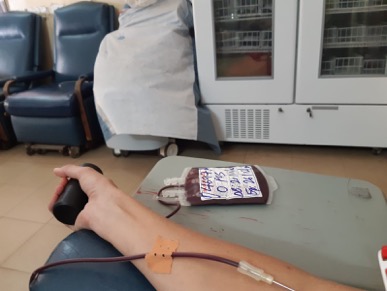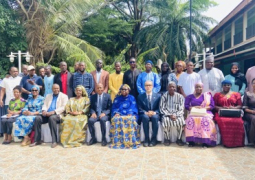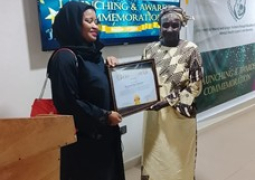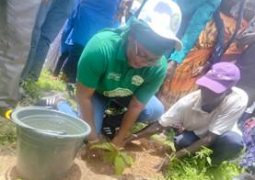
The move comes amid the urgent need to help children admitted at the Department especially in providing readily available blood for transfusions.
Moreover, during the exercise the key word is ‘every drop counts and blood is life.’
In an interview with The Point at the Blood Bank unit of the hospital, Dr. Sara Loetz, a Pediatric Consultant at the hospital, while calling on people to volunteer and donate blood to the country’s blood bank, acknowledged that donating a pint of blood saves life.
Dr Loetz revealed that they receive patients from all over the country, further reminding that during this period of the year, they receive a lot of kids with severe malaria.
As a pediatrician, who has been working on children for years, she has observed that one of the main complications of malaria is severe anemia leading to low blood.
"So, we need very urgent blood transfusion, as many of our patients are coming from very far. So, we cannot rely on relatives in Bansang, Basse or even Farafenni to come and give blood. So, we do need some blood in the blood bank readily available to be able to give it immediately when patients are in need of blood."
Comenting on the types of blood they are targeting during this exercise, Dr. Loetz explained that principally, they would need all types of blood.
"But of course, there are some types which are in more need. So (O) negative blood can be given to everybody, but it is also a blood type that is relatively rare."
Dr. Loetz thus called on people with O negative blood type to come forth and donate blood, acknowledging that ‘if one donates blood, it saves live.’
Also speaking in an interview, Dr. Cesare Medri, a Blood Specialist and Hematology Consultant at the Edward Francis Small Teaching Hospital, acknowledged that blood is life and blood readily needed is not a Gambian problem, but a universal one.
"Blood is freely donated in The Gambia and freely given. So, when a physician requires blood for a patient that can have many reasons like low blood due to pregnancy, acute bleeding because the patent has car crash or children with malaria."
He informed that through this initiative they are not only trying to collect blood from people, but to also build confidence and trust among their pool of volunteers that can provide them with blood in the next month and even a year.
He acknowledged that there are many blood types and the most common and famous is A, B and O, reminding that each individual belongs to a group either A, B or O.
However, Dr. Medri stated blood O-negative is considered to be a universal blood type and that it's safe to give to anyone, regardless of their blood type.
"So O-negative blood type can donate to anybody. So, having a pint of O negative blood means that anybody coming to the blood requesting blood, can be given this blood."
To this end, he renewed his call for people to volunteer and donate blood to save someone’s life, as blood is life.
Dr. Medri also talked about the process they undertake in separating blood from other vital substances. "So we need donors as every drop counts."
On some of the widely held misconceptions regarding one donating blood, Dr. Medri maintained that this widely held belief is not a Gambian problem alone. He called on people to do away with such beliefs and donate blood to save life.
"It’s found everywhere and I spent major part of my life trying to explain to patients and even donors what blood donation entails and what it does not. So this common belief that people have when it comes to blood donation is not true. People can once and donate once and not donate for the rest of their lives and that is ok. We are grateful and will forever be grateful and they don’t have to do anything more. If they want to come back and donate again, they can do it. For male, they can donate up to four times in a year, whereas, female which tends to have lower blood level, can donate up to two times in a year."
Mariama A. Sillah, a medical student at the University of The Gambia, who partnered with the hospital to conduct this blood donation campaign, encouraged all especially female colleagues to volunteer and donate blood.





